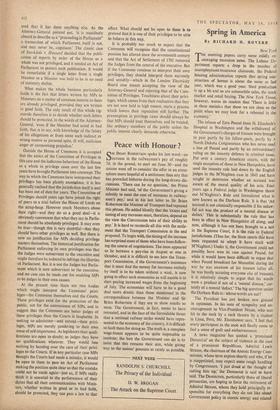Peace with Honour ?
S112. BRIAN ROBERTSON spoke his last word—an increase in the railwaymen's pay of roughly 7d. in the pound, to start on June 30—and the unions went off to consider the offer in an atmo- sphere more hopeful of a settlement than any that has prevailed hitherto during the long-drawn dis- cussions. 'There can be no question,' the Prime Minister had said, 'of the Government's giving a subsidy to meet the cost of increases in railway- men's pay,' and in his last letter to Sir Brian Robertson the Minister of Transport had repeated this phrase. He added bluntly that the 'extent and timing of any increases must, therefore, depend on the view the Commission take of their ability to pay.' It is hard to reconcile all this with the settle- ment that the Transport Commission in the end proposed. To begin with, the timing of the increase has surprised most of those who have been follow- ing the course of negotiations. The issue appeared to lie between a pay-rise in August or one in October, and it is difficult to see how the Trans- port Commission, if the Government's insistence that it must find the money for increases entirely by itself is to be taken without a wink, is now going to effect such economies as will enable it to start paying increased wages from the beginning of July. The economies will have to be a good deal more drastic than those mentioned in the correspondence between the Minister and Sir Brian Robertson if they are to show results so soon. The Government, in fact, seems to have retreated, and in the face of the formidable threat that a national railway strike would have repre- sented to the economy of the country, it is difficult to fault them for doing so. The truth is, a complete wage-freeze appears to be quite impossible to institute; the best the Government can do is to insist that this remains their aim, while giving way to the unions' pressure as rarely as possible.


































 Previous page
Previous page